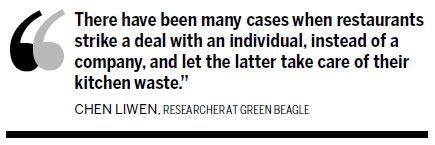Duck chain 'unaware' of oil recycling
Updated: 2012-05-28 07:53
By Wang Qingyun (China Daily)
|
||||||||
Quanjude, a famous chain of Peking duck restaurants, said its staff had no idea that waste oil collected from its kitchens could have been resold to streetside food vendors and reused.
Wang Duohao, 40, who used to collect duck fat and oil from Quanjude restaurants in the Sanyuanqiao and Aoyuncun neighborhoods, is accused of supplying "gutter oil" - recycled waste oil - to fried food vendors and other people from 2004 to October 2011.
"The procuratorate (prosecuting body) believes that there is enough evidence that Wang produced and sold cooking oil by using gutter oil, and should be held accountable for producing and selling poisonous and harmful food," read a notice from the Chaoyang district people's court.
If found guilty, Wang faces up to five years in prison, unless his actions are found to have caused serious harm or death, in which case the maximum penalty is death.
|
 |
Managers at both branches were unavailable to comment on Sunday. However, a manager surnamed Zhu at the Aoyuncun branch was quoted by the Beijing Youth Daily on Saturday as saying that managers were "deceived" by Wang and had no idea that the oil salvaged was sold as cooking oil.
They said that they signed a contract with Wang in 2004, because Wang said that he was from a company qualified in treating kitchen waste, a claim he supported by showing them fake documents and papers.
"Not until police came to investigate did we realize that Wang hadn't given the oil he collected to the company. Instead, he sold it," the manager was quoted as saying by the Beijing Youth Daily. He said the branch sold kitchen waste to Wang for 2 yuan (30 cents) per kilogram.
However, Chen Liwen, a researcher at Green Beagle, a Beijing environmental protection group, said Quanjude should have conducted an investigation to see if Wang actually was from a qualified company.
"There have been many cases when restaurants strike a deal with an individual, instead of a company, and let the latter take care of their kitchen waste," she said.
Huang Shuo, an information officer at the Chaoyang district court, told China Daily the date of the court hearing is yet to be determined.
In January, the Beijing government issued an announcement to regulate the salvage of kitchen waste produced by restaurants in the city, asking its districts and counties to appoint qualified companies to collect kitchen waste from local restaurants.
The announcement also said that restaurants should sign contracts with these companies if they want to dispose of used oil. The restaurants were also told to inform the government of the name of the company doing the recycling and the destination of the oil by filling in forms online and registering with local authorities.
Only four companies have been licensed by the city to do oil recycling, of which only three are actually in operation, said Li Dong, president of Hailianghongxin Bio-fuel Technology, one of the four companies.
"The Quanjude incident reflects the problem in the business of waste oil recycling," said Li, who believes that the government lacks sufficient inspection capacity to guarantee that waste oil goes where it belongs.
He said his company installs oil-water separators for free and recycles waste oil.
"We don't pay for the waste oil, and there are cases when restaurants sell the oil to others who pay."
Chen agreed. "There are two kinds of kitchen waste: one is solid waste and the other is oily waste that can be used to extract grease from," she said.
"The city's government lacks effective inspection of recycling to guarantee that (waste) has gone to qualified companies. Also, the city should accelerate the pace of upgrading the infrastructure to treat waste kitchen oil."
Contact the writer at wangqingyun@chinadaily.com.cn

 Relief reaches isolated village
Relief reaches isolated village
 Rainfall poses new threats to quake-hit region
Rainfall poses new threats to quake-hit region
 Funerals begin for Boston bombing victims
Funerals begin for Boston bombing victims
 Quake takeaway from China's Air Force
Quake takeaway from China's Air Force
 Obama celebrates young inventors at science fair
Obama celebrates young inventors at science fair
 Earth Day marked around the world
Earth Day marked around the world
 Volunteer team helping students find sense of normalcy
Volunteer team helping students find sense of normalcy
 Ethnic groups quick to join rescue efforts
Ethnic groups quick to join rescue efforts
Most Viewed
Editor's Picks

|

|

|

|

|

|
Today's Top News
Health new priority for quake zone
Xi meets US top military officer
Japan's boats driven out of Diaoyu
China mulls online shopping legislation
Bird flu death toll rises to 22
Putin appoints new ambassador to China
Japanese ships blocked from Diaoyu Islands
Inspired by Guan, more Chinese pick up golf
US Weekly

|

|






